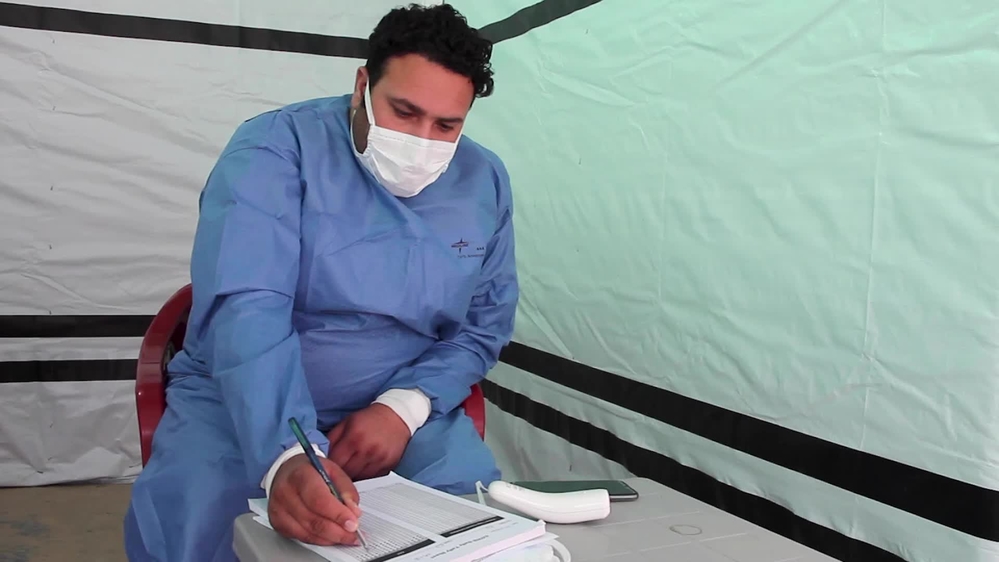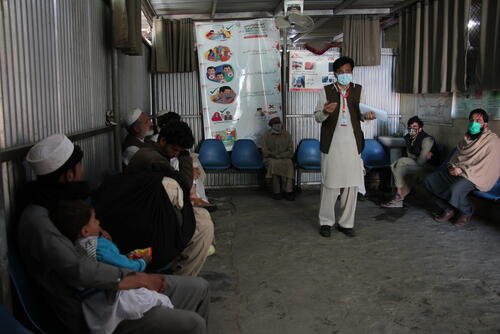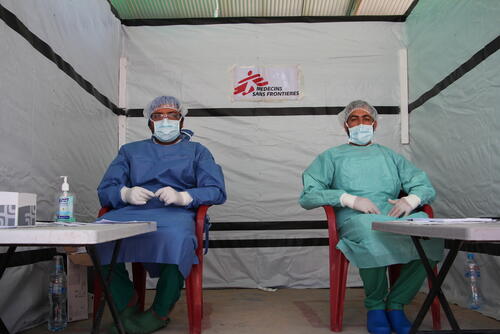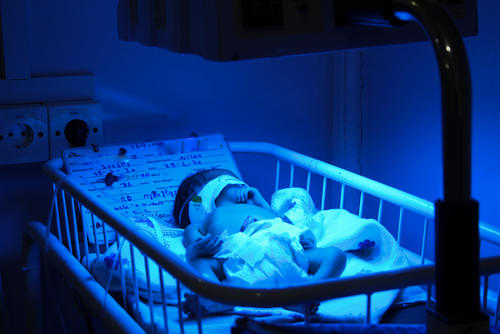Amid the sound of horns honking, people shouting, and machinery whirring, patients cross the street and enter Timergara District Headquarter hospital through the high black metal gates. On 3 April, Médecins Sans Frontières (MSF) installed a COVID-19 screening system at this hospital in the Lower Dir district of Khyber Pakhtunkhwa, in northern Pakistan, to help protect against the virus and prevent it from spreading inside the facility to healthcare workers, patients and their caretakers, and by extension the community.
Despite the movement restrictions imposed to prevent transmission of the new coronavirus, over 1,000 people from Lower Dir and the surrounding districts come through these gates every day, either for medical consultations or to accompany those who are sick or injured.

MSF starts coronavirus COVID activities in Timergara
Detailed triage process for hospital arrivals
New arrivals that are not emergencies follow the orange netting barriers as they are guided to a handwashing station – a large white covered vat of water with a tap, and some soap – and then to the pre-triage area. Throughout, a member of staff shouts instructions through a loudspeaker, competing with the ambient noise, telling them to keep a distance of at least 1.5 metres from each other and wait for their turn to be seen by the nurses waiting for them.
Patients and the persons accompanying them present themselves at the two desks in the open-air area, answer a series of questions about their travel history, whether they have had any contact with a COVID-19-positive person and/or if they are suffering from flu-like symptoms. From there, they are separated into those who can carry on their journey into the hospital and those who are installed in the waiting room for another layer of triage. After a more in-depth discussion, the number is whittled down further.
Suspected cases are sent through another door to one of the three consultation rooms MSF has set up in collaboration with the Department of Health. Patients are seen by a doctor in full protective clothing, and it is decided if a swab should be taken for analysis. The doctor then determines if the patient should be sent to the 15-bed isolation ward within the hospital or quarantined at home. Those told to quarantine at home either go in their own car or are taken there by ambulance, in line with guidance from the health authorities.
The screening reassures me that I don’t have disease and going through this process also increased my knowledge [of COVID].Ali Muhammad, patient's father at Timergara DHQ hospital
“I don’t know this disease … I feel this screening set-up has been installed to protect people like me,” said 45-year-old Ali Muhammad, who had come to the DHQ hospital to accompany his daughter who was suffering from a problem with her legs. “The screening reassures me that I don’t have disease and going through this process also increased my knowledge [of COVID].”
The first case of COVID-19 was confirmed in Pakistan on 26 February and now the number of people with the new coronavirus is over 8,400, with more than 175 deaths.
MSF teams spring into action with COVID-19 response activities
MSF has been supporting Timergara DHQ hospital since 2009 in various departments and over the years has helped manage a number of outbreaks of disease such as dengue, measles and acute diarrhoea. COVID-19 as a new virus is different, but the logic of infection control and epidemic management remain similar, and our staff’s expertise allowed them to put the pre-triage and isolation ward in place rapidly.

Across Pakistan, MSF is conducting extensive awareness-raising activities on ways for people to protect themselves and prevent the spread of the virus. Teams are speaking to local communities, and messages are being shared via the radio and in newspapers, as well as on social media. MSF teams have also put protective COVID-19 measures and isolation areas in place in most of our medical facilities across Pakistan.
“We are coordinating with the health authorities to see if we can further support Pakistan as it tackles COVID-19 but there are significant challenges and obstacles when it comes to such things as medical supplies and protective equipment supplies”, explains Aymen Abdullah, an MSF Country Representative in Pakistan. “And the safety of our staff and our patients remains our priority”.
Difficult decisions on specialised services
In light of this, MSF has made the difficult decision to put our cutaneous leishmaniasis treatment services in Peshawar, Bannu and Quetta on standby, as well as our nutrition mobile clinics in districts of Naseerabad and Jaffarabad. We have also suspended activities in our maternity hospital in Peshawar for 14 days. These are only temporary measures though to avoid the spread of COVID-19 and teams hope to restart very soon, when it is safe to do so.
Back in Timergara, the COVID-19 response team has screened around 14,000 people and has undertaken 245 COVID-19 consultations since the start of the activities. Nineteen people have been admitted to the isolation ward of which eight are confirmed as having the new coronavirus, and four have been discharged as cured.
There remains a lot to be done but setting this system up, seeing it at work and celebrating as people beat the virus gives some much-needed hope in the midst of a pandemic.
Médecins Sans Frontières is an international medical humanitarian association that delivers emergency aid to people affected by armed conflict, epidemics, natural disasters and exclusion from healthcare. MSF first started working in Pakistan in 1986, and now provides urgently needed quality medical care to people in Balochistan, Khyber Pakhtunkhwa and Sindh provinces. In Timergara, MSF manages normal as well as complicated obstetric cases, including surgeries when needed, and runs a neonatal unit for premature and low-birth-weight babies. In 2019 alone, MSF teams assisted over 14,000 deliveries and admitted 2,284 newborn babies to the neonatal ward.






